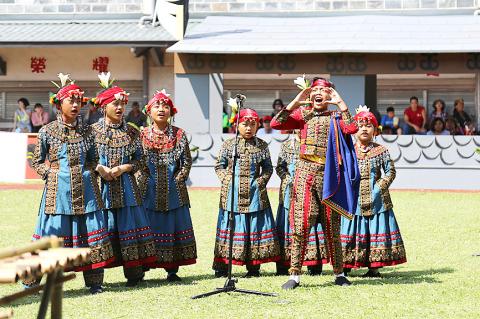The success of Aboriginal choir groups over the past few years at numerous international events shows the success of programs teaching Aboriginal languages and gives Aborigines hope that their customs and traditions will not vanish, a Pingtung County Government official said.
Not having developed their own writing systems, Aborigines have relied on the use of songs to pass down tribal wisdom — customs, rites and traditions — from generation to generation, the official said.
However, the songs were themselves dry and uninteresting to younger generations and were in danger of being lost, the official added.

Photo: Chiu Chih-jou, Taipei Times
Taiwu Ancient Ballads Troupe founder and instructor Camake Valaule said that efforts to find old songs and conserve them were abandoned for at least a generation.
“Even the elders sometimes say that learning about the old songs is not worth it,” Camake said.
Cingyeh Elementary School choir instructor Tang Hsiu-yueh (唐秀月) echoed the concern, saying that if children are not taught their native language at a young age, soon no one would know how to sing the songs anymore.
Efforts to promote Aboriginal language education for children within the nation are helping to mitigate the danger, Pingtung County Bureau of Cultural Affairs Director Wu Li-hua (伍麗華) said.
The bureau and other organizations have conducted many field studies on the Paiwan and Rukai languages, the two most prevalent Aboriginal languages in the county, Wu said.
The county spearheaded the movement of starting Aboriginal choir groups, encouraging a shift from using the bel canto method of singing the songs of other groups to having elementary-school choir groups sing their own Aboriginal songs as the songs were meant to be sung.
As a result, many Aboriginal choir groups — including the Taiwu Ancient Ballade Troupe, the Cingyeh Choir and the Puzangalan Children’s Choir — have allowed the world to see the “real” Taiwan.
Puzangalan Children’s Choir instructor Wu Sheng-ying (吳聖穎) said that the choir included a Paiwan song in its performance last week at the 11th International Johannes Brahms Choir Festival and Competition.
The choir won first place in the Children’s Choirs category, as well as placing second in the Folklore category and fifth in the Sacred Choral Music a capella category.
Tang said that those in the choir at Cingyeh Elementary School have become more confident about their Aboriginal culture over the past few years after discovering that the songs of their ancestors are appreciated by others in the world.
The older generation now has hope that customs and traditions will be passed on, Camake said.

A Taiwanese software developer has created a generative artificial intelligence (AI) model to help people use AI without exposing sensitive data, project head Huang Chung-hsiao (黃崇校) said yesterday. Huang, a 55-year-old coder leading a US-based team, said that concerns over data privacy and security in popular generative AIs such as ChatGPT and DeepSeek motivated him to develop a personal AI assistant named “Mei.” One of the biggest security flaws with cloud-based algorithms is that users are required to hand over personal information to access the service, giving developers the opportunity to mine user data, he said. For this reason, many government agencies and

The National Fire Agency on Thursday said a series of drills simulating a magnitude 8.5 earthquake would be held in September to enhance the government’s emergency response capabilities. Since earthquakes cannot be predicted, only by continuously promoting disaster prevention measures could Taiwan enhance its resilience to earthquakes, agency Director-General Hsiao Huan-chang (蕭煥章) said in a news release. The exercises would be held to mark annual National Disaster Prevention Day on Sept. 21, the aim of which is to test Taiwan’s preparedness and improve its earthquake resilience in case of a major temblor, Hsiao said. As part of those drills, an earthquake alert would

DEFENSE: The National Security Bureau promised to expand communication and intelligence cooperation with global partners and enhance its strategic analytical skills China has not only increased military exercises and “gray zone” tactics against Taiwan this year, but also continues to recruit military personnel for espionage, the National Security Bureau (NSB) said yesterday in a report to the Legislative Yuan. The bureau submitted the report ahead of NSB Director-General Tsai Ming-yen’s (蔡明彥) appearance before the Foreign and National Defense Committee today. Last year, the Chinese People’s Liberation Army (PLA) conducted “Joint Sword-2024A and B” military exercises targeting Taiwan and carried out 40 combat readiness patrols, the bureau said. In addition, Chinese military aircraft entered Taiwan’s airspace 3,070 times last year, up about

STRICTER ENFORCEMENT: Taipei authorities warned against drunk cycling after a sharp rise in riding under the influence, urging greater public awareness of its illegality Taipei authorities have issued a public warning urging people not to ride bicycles after consuming alcohol, following a sharp rise in riding under the influence (DUI) cases involving bicycles. Five hundred and seven people were charged with DUI last year while riding YouBikes, personal bicycles, or other self-propelled two-wheelers — a fourfold increase from the previous year, data released by the Taipei Police Department’s Traffic Division showed. Of these, 33 cases were considered severe enough to be prosecuted under “offenses against public safety,” the data showed. Under the Road Traffic Management and Penalty Act (道路交通管理處罰條例), bicycles — including YouBikes and other